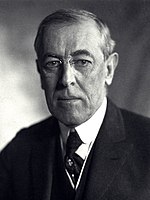| ||||||||||||||||||||||||||
| Turnout | 79.57% (of registered voters) 57.91% (of eligible voters) | |||||||||||||||||||||||||
|---|---|---|---|---|---|---|---|---|---|---|---|---|---|---|---|---|---|---|---|---|---|---|---|---|---|---|
| ||||||||||||||||||||||||||
 County Results
| ||||||||||||||||||||||||||
| ||||||||||||||||||||||||||
| Elections in California |
|---|
 |
The 1916 United States presidential election in California took place on November 7, 1916 as part of the 1916 United States presidential election. State voters chose 13 representatives, or electors, to the Electoral College, who voted for president and vice president.
California narrowly voted for the Democratic incumbent, Woodrow Wilson, over the Republican nominee, Associate Justice Charles Evans Hughes.
Although very close, this was not as close as the previous election or the critical 1892 election in California, and was only the third-closest state in a thrilling election behind New Hampshire and Minnesota. As of 2024, no subsequent presidential election in California has been decided by a smaller margin, although California was decided by less than one point in 1948 and 1960. This was the closest result where California's electoral votes were not split.
Following on from breaking half-a-dozen county droughts in 1912, Wilson became the first Democrat to carry Placer County, Plumas County, and Santa Barbara County, since Stephen A. Douglas in 1860, and the first to carry the counties of Contra Costa and Santa Cruz since James Buchanan in 1856.[2] Had Hughes won California, he would have won the election despite losing the popular vote. This is the last election in which a Republican candidate carried Los Angeles County but failed to carry the state of California. This is also the most recent election when California would decide the overall winner of a presidential election, despite routinely having among the highest, or highest number of electoral votes after the next reapportionment following the 1930 census. Had Hughes carried the state, he would have been elected with 267 electoral votes to Wilson's 264.
- ^ "Historical Voter Registration and Participation in Statewide General Elections 1910-2018" (PDF). California Secretary of State. Retrieved May 5, 2022.
- ^ Menendez, Albert J.; The Geography of Presidential Elections in the United States, 1868-2004, pp. 153-155 ISBN 0786422173


